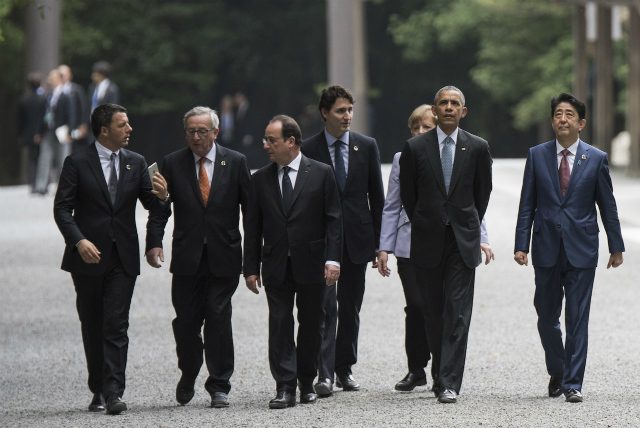SUMMARY
This is AI generated summarization, which may have errors. For context, always refer to the full article.

ISE-SHIMA, Japan (UPDATED) – Rising maritime tensions in Asia are a cause for concern and disputes should be resolved legally and peacefully, the leaders of the Group of Seven advanced democracies said Friday, May 27.
Though no individual countries were mentioned, the contents of their declaration at the close of an annual summit appeared to be directed at China.
Beijing’s claim to nearly the entire South China Sea has angered some of its Southeast Asian neighbors and sparked fears over threats to freedom of navigation in the body of water that encompasses key global shipping lanes.
The Philippines, along with Brunei, Malaysia and Vietnam also have competing claims in the expansive maritime area.
China’s ongoing militarization of islets and outcrops there has sparked broader apprehensions about the country’s growing regional might as well as its threats to back up the claims with force, if necessary.
“We are concerned about the situation in the East and South China Seas, and emphasize the fundamental importance of peaceful management and settlement of disputes,” G7 leaders said.
China is also locked in a dispute with G7 host Japan over uninhabited rocky outcroppings in the East China Sea claimed by both countries.
The G7 – the United States, Japan, Britain, France, Germany, Italy and Canada – said settlement of disputes should be “peaceful” and “freedom of navigation and overflight” should be respected.
Washington – which has embarked on a foreign policy “pivot” towards Asia – fears Beijing is seeking to impose military controls over the entire area.
The US military has conducted several “freedom of navigation” operations, in which planes or ships pass within a 12-nautical-mile buffer around the Chinese installations in the South China Sea, angering Beijing.
The G7 leaders also said that claims in the area should be made based on international law and countries should refrain from “unilateral actions which could increase tensions” while also avoiding “force or coercion in trying to drive their claims”.
They also stressed that judicial means “including arbitration” should be utilized.
That call came ahead of a ruling expected within weeks on China’s claims brought by the Philippines to the Permanent Court of Arbitration in the Hague. Beijing has said it does not recognize the case. (READ: Chinese state media warns G7 against South China Sea ‘meddling’)
European Council President Donald Tusk said Thursday, May 26, on the sidelines of the G7 meeting that the group needs to take a “clear and tough stance” on China’s maritime claims as well as the Russian annexation of Crimea.
“The test of our credibility at the G7 is our ability to defend the common values that we share,” Tusk told reporters on Thursday.
That same day, Chinese state media on warned the group of seven not to “meddle” in the South China Sea disputes.
China reacted angrily after a statement last month by G7 foreign ministers on maritime issues at their meeting in Hiroshima, and summoned top diplomatic representatives in Beijing to complain. – Rappler.com
Add a comment
How does this make you feel?
There are no comments yet. Add your comment to start the conversation.